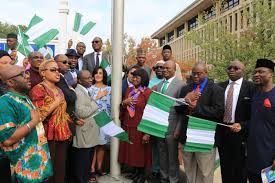Nigerians are everywhere! From London to Houston, Toronto to Dubai, you’ll find us thriving, hustling, and making our mark. But one thing that stands out is how we hold tight to our culture, no matter where we go. Our strong cultural identity isn’t just about nostalgia—it’s a secret weapon that helps us succeed in the diaspora.
Why Culture = Success for Nigerians Abroad
Community Support (“Na Who You Know”)
Nigerians abroad understand the power of community. Whether it’s helping a new arrival settle in, connecting someone to job opportunities, or contributing money for a member in need (àjo or esusu), our culture of togetherness gives us an edge. The phrase “your brother’s keeper” is real in Nigerian communities abroad.
Strong Work Ethic (“No Sleep, No Shine”)
Nigerians are known for hard work, and this comes from our cultural upbringing. Many of us grew up hearing “If you no work, you no go eat”—and that mentality follows us abroad. Whether it’s juggling multiple jobs, studying hard, or starting a business, that Nigerian resilience keeps us winning.
Pride in Our Roots (“Naija No Dey Carry Last”)
When you know where you’re from, you walk with confidence. Nigerians abroad proudly rep their heritage—whether through fashion (rocking Ankara to weddings), food (jollof rice debates never end), or language (mixing Pidgin with English). This pride opens doors, builds networks, and even creates business opportunities.
How We Keep Our Culture Alive Abroad
The Nigerian diaspora community actively preserves and promotes its rich cultural heritage through a blend of family practices, community engagement, cuisine, and cultural education. These efforts not only strengthen identity among Nigerians but also enrich the broader cultural landscape in our adopted homes.
Food: The Ultimate Connector
Food is a cornerstone of cultural preservation for diaspora-Nigerians. No matter where Nigerians go, we MUST find our food. Traditional dishes such as jollof rice, egusi soup, pounded yam, and akara are prepared at home, and Nigerian children born abroad easily know the difference between pounded yam and amala! Also, from setting up African markets to organizing “small chops” parties, we make sure plantain, egusi soup, and suya are never far away. and increasingly featured in Nigerian restaurants across the globe. These establishments serve as cultural hubs, offering authentic flavors and a sense of home for immigrants while introducing foreigners to Nigerian culinary traditions. Restaurateurs like Mrs. Olajumoke Onimole have turned their businesses into cultural embassies, using food to spark conversations about Nigerian customs and history, and even hosting educational events and cultural celebrations for the wider community.
Events & Celebrations (“Owambe for Foreign”)
Nigerians don’t play with celebrations—you name it, we turn up! Nigerian immigrant communities organize regular gatherings, festivals, and religious events that reflect the diversity of Nigeria’s ethnic groups. These include celebrating Nigerian Independence Day, hosting traditional weddings and naming ceremonies, and organizing cultural festivals that showcase music, dance, and attire. Such events provide opportunities for younger generations to learn about their heritage and for the broader public to experience Nigerian culture firsthand.
These events keep our customs alive and introduce our culture to others.
Language & Music (“Pidgin No Dey Die”)
Even if we speak perfect English, maintaining native languages such as Yoruba, Igbo, and Hausa is another way Nigerians keep their culture alive. Pidgin still remains our unofficial language. Within homes and community settings, elders pass down stories, proverbs, and traditional wisdom, ensuring that cultural values and history endure across generations.
Art, Music, and Fashion
Nigerians celebrate their heritage through traditional clothing, music, and art. Wearing colorful fabrics like Ankara or performing traditional dances at community events helps reinforce cultural pride and visibility. And thanks to Afrobeats, the whole world is now vibing to our music. Artists like Burna Boy and Wizkid make it easy to stay connected to home. Restaurants and community centers often display Nigerian artwork and artifacts, further educating visitors about the country’s rich artistic traditions.
Nigerian Churches & Associations
Religious practices remain central to Nigerian life, with many participating in churches or mosques that serve as both spiritual and cultural gathering places. These institutions often support cultural education and community-building efforts.Churches like RCCG, Winners’, and Deeper Life have branches worldwide, creating spiritual and social hubs for Nigerians. Also, town unions (like Igbo, Yoruba, or Edo associations) help people stay connected to their roots.
Through these strategies, the Nigerian immigrant community worldover, not only maintains its cultural traditions but also contributes to the multicultural fabric of their host countries fostering greater understanding and appreciation of Nigeria’s vibrant heritage.
Final Word
Our culture is our strength. It keeps us grounded, helps us succeed, and ensures that no matter how far we go, we never forget home. To all Nigerians in the diaspora—keep flying the flag high! #NaijaToTheWorld
What do you think? How do you keep your Nigerian culture alive abroad? Drop your comments! 👇

